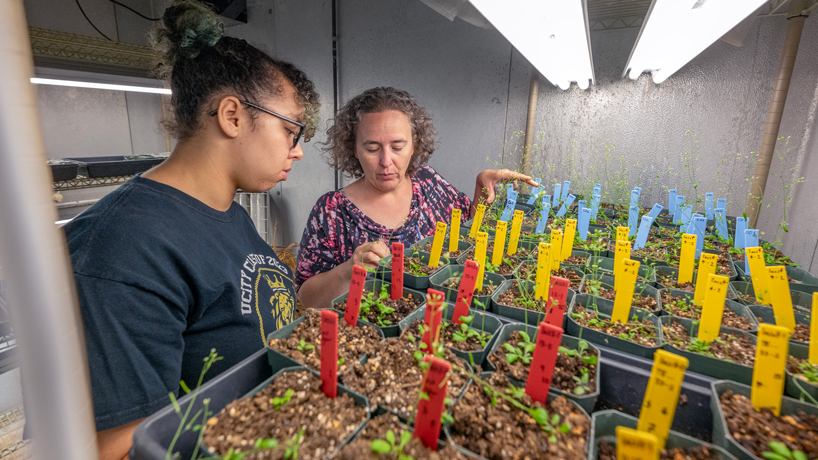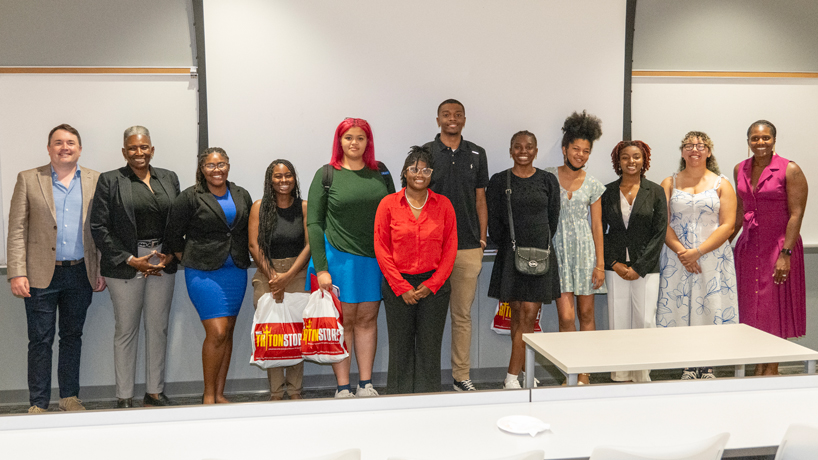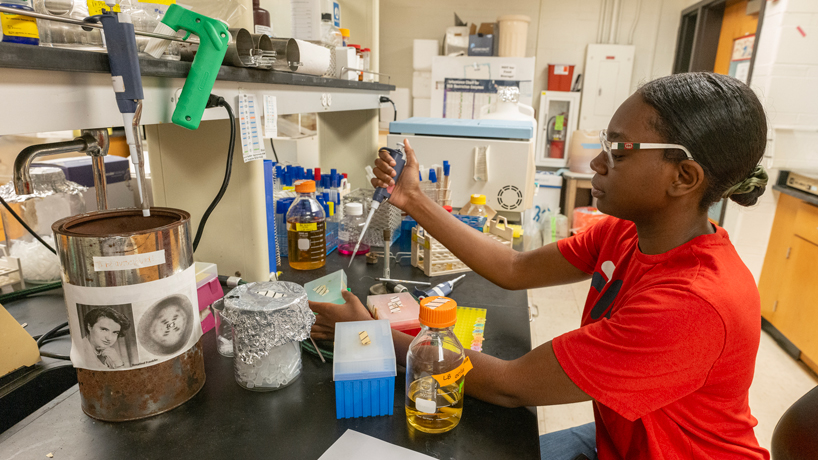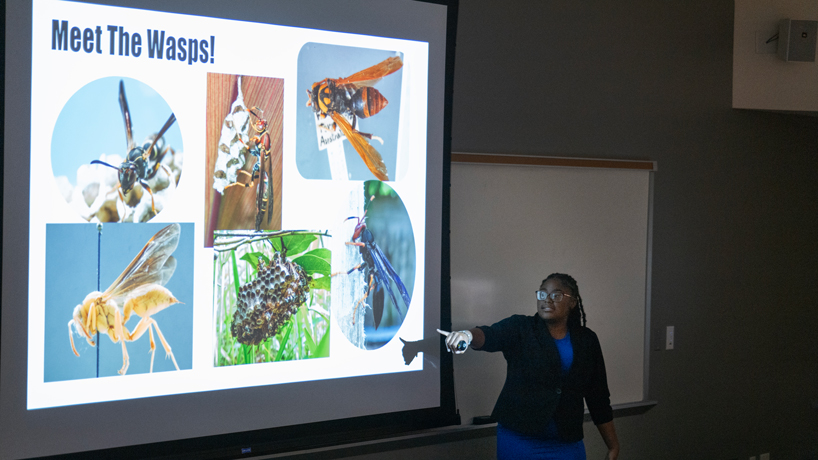
University City High School graduate Zofia Reed (at left) looks at Arabidopsis plants growing in the lab of Associate Professor Bethany Zolman. Reed spent the past six weeks researching spent the past six weeks researching the impact of soil bacteria on plant development as part of the Collaborative Laboratory Internships and Mentoring Blueprint. (Photos by Derik Holtmann)
Miranda Ming remembers meeting Zofia Reed last year when she was nearing the end of her junior year at University City High School and first applying to be part of the Collaborative Laboratory Internships and Mentoring Blueprint at the University of Missouri–St. Louis.
“I had an opportunity to talk with her, and she said, ‘Well, Dr. Ming, I don’t know what I want to do. Maybe I’ll do a gap year,’” the CLIMB co-director told a few dozen people in attendance Friday afternoon at Benton Hall for a ceremony to mark the closing of Reed’s second year in the program.
It was hard to fit Ming’s recollection about a young woman searching for direction with the sight of Reed that same day confidently presenting her research on the interaction between soil and bacteria and its impact on growth and development of the model plant Arabidopsis thaliana.
CLIMB program co-directors Lon Chubiz (at left), Rhonda Key (second from left) and Miranda Ming (at right) and coordinator Devin Elkins helped celebrate the accomplishments of 2023 interns Somir Wilson, Paris Prince, Na’kiyah Abbott-Harrell, Nichelle Davis, Aniyah Ware, Cailey Shanks, Jordyn Peebles and Zofia Reed during a closing event held Friday afternoon in Benton Hall.
Working in the lab of Bethany Zolman, an associate professor of biology, Reed has been helping develop a new method for studying how plants and bacteria affect each other.
“She’s done really well,” Zolman said. “This has been a fun project, just trying to figure it out, and she’s really kind of rolled with that. She has done a lot of measurements. We’ve spent a lot of time thinking about how to analyze data and do statistics, and she gets this uncomfortable look on her face when you say things about that, but she figured it out.”
After her two summers in CLIMB, Reed also came away with a better sense of where she’d like to steer her academic pursuits and professional career in the future.
“This internship last year really made me realize how much I love science, and it made me want to go into it and learn about research,” said Reed, who will enroll at UMSL next month and plans to major in biology. “I’m so glad that I was able to learn what it takes, and I’m really grateful that they invited me back.”
CLIMB was created to try to reduce the opportunity gap by giving high-ability students from under-resourced school districts the chance to engage in scientific lab research in a university setting through a paid six-week internship program. It’s an experience they likely otherwise would not have.
Patricia Parker, the former E. Desmond Lee Endowed Professor of Zoological Studies at UMSL, developed the idea for the program with high school science teacher Remy Bryant and worked with Ming and Rhonda Key to make it a reality in 2015, when the two were administrators in the Jennings School District. Ming is now executive director of Momentum Academy, a charter school in St. Louis, and Key serves as the assistant superintendent for high school education, school safety and alternative education for the Hazelwood School District.
Over the past nine years, the program has grown to include not only Jennings but Hazelwood, University City, Ritenour and Riverview Gardens with about 90 students participating.
With Parker’s retirement last September, Lon Chubiz, an associate professor of biology, took over her role directing CLIMB in concert with Ming and Key.
Hazelwood East graduate Aniyah Ware conducts an experiment while working in the lab of Associate Professor Wendy Olivas and studying Parkinson’s disease earlier this summer.
“Where Patty Parker took things is from nothing to something really impactful,” Chubiz said. “I feel like as a program steward, my role is creating sustained impact and working with our other co-directors to develop long-term, stable relationships with our community partners to make sure that CLIMB, year in and year out, remains a great program and offers great opportunities for students.”
Eight young women – Jordyn Peebles, Paris Prince and Aniyah Ware from Hazelwood; Nichelle Davis from Jennings; and Reed, Na’Kiyah Abbott-Harrell, Cailey Shanks and Somir Wilson from University City – took part in the program as paid interns this summer.
UMSL faculty members Chubiz, Zolman, Aimee Dunlap, Sara Miller and Wendy Olivas from the Department of Biology and Michael Nichols, Keith Stine and Jinjia Xu from the Department of Chemistry and Biochemistry hosted students over the past six weeks. Students researched everything from Parkinson’s disease to the reason for the different hues of wasps or from the impact of BotaniGard on common Eastern bumble bees to the fabrication of hierarchical bimodal nanoporous gold monolith.
Peebles, who earned an associate degree from St. Louis Community College while completing high school at Hazelwood East and will begin studying at Howard University as a biology pre-med major this fall, spent her second year in CLIMB in Nichols’ lab, studying amyloid beta protein and how it forms as it contributes to the development of Alzheimer’s disease.
“Mostly what I was doing were tests for cell viability and cell toxicity,” Peebles said. “I test to see which compounds are toxic to the cells using a fluorescence machine.”
University City student Somir Wilson gives a presentation last Friday on research she did on the hues of wasps while working in Assistant Professor Sara Miller’s lab.
“Her enthusiasm, attention to detail and maturity is superb for a recent high school graduate,” Nichols said of Peebles. “She has contributed significantly to the development of a new biochemical assay that is important for our research objectives and has worked extremely well with graduate students Cristina Sinobas Pereira and Ryan Domalewski. During her internship, Jordyn always put forth substantial effort to fully understand her projects and how they may contribute to the overall picture of Alzheimer’s disease and neuroinflammation.”
In addition to their work in the labs, CLIMB interns had a chance to learn about different avenues for scientific careers through conversations with practitioners, including a local OB-GYN and researchers at the Saint Louis Zoo, and in field trips to places such as the Shaw Nature Reserve, Horseshoe Lake and the Saint Louis University Forensics Lab.
The experiences they’ve had this summer have made recent high school graduates such as Reed and Peebles a little more comfortable and confident as they prepare to find their footing as college freshmen this fall.
“I’m actually very grateful that I do know some of the professors in the biology program, especially Zolman and Chubiz,” Reed said. “I think those are great connections for me to have for my first semester because they helped me realize that there’s really nothing to stress about.”
It’s just as valuable for Peebles, even going to a different institution.
“It’s a great opportunity,” Peebles said. “It looks really good on your resume as well, being able to be a part of a research lab, researching all of these different types of things in high school or getting ready to transition to college. That’s a great experience. I have a couple of friends who are seniors in college this year, and they’re just now getting into research lab. I feel like it puts me ahead of my peers.”

















